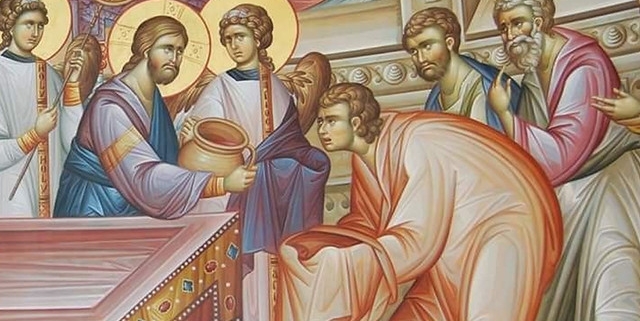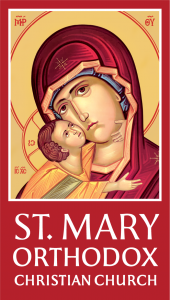On Frequent Holy Communion, Part Two
By Metropolitan Saba (Isper)
Today there is widespread misconception among believers between “being worthy” and “being ready” to receive Holy Communion. Whoever refrains from partaking of the chalice of Holy Communion due to unworthiness is confusing this with unreadiness. No human being is worthy of God dwelling in Him and uniting with Him. Who among us acquires perfect purity and who is among us is without sin? No human being is worthy of this great blessing. God dwells among us and in us because of His overwhelming mercy, His utmost love, and His condescension that is incomprehensible to the human mind. Therefore, there will never come a time when we will be worthy of the Eucharist. Rather, when we think that we have become worthy, we have fallen into the greatest sin, that is, into pride, the root of all evil.
Yet, we must prepare ourselves to receive the Lord. Just as a person prepares to welcome an important guest into his home by cleaning and arranging it, and then he dresses in clean and appropriate clothes, so the believer prepares to receive the Lord in the “house” of his or her soul. So, on the one hand, only a spirit of contrition and the conviction that I am a sinner and not worthy at all, relying on God’s vast mercy, can enable me to approach the chalice. On the other hand, I must seek to respond to God’s abundant mercy by committing myself to the appropriate preparation for Holy Communion that the Church has appointed in general, and the prayer rule which my spiritual father gives me personally, lest I become complacent and take the Lord’s mercy for granted, and then forget the importance of my role in my salvation. In short, we must realize that we are always unworthy, and yet must strive to partake worthily, through the necessary preparation.
Based on the teachings of the Gospel, the Church has established several means to help us prepare for Communion: the sacrament of Confession, the pre-Communion prayers, reconciliation with others, and correcting our bad habits, in addition to abstaining from food and drink from midnight before the Divine Liturgy and arriving on time to participate in the Divine Liturgy. Adherence to these instructions is essential and important in order to partake of the Holy Body and Blood of the Lord in a worthy manner, that is, with proper preparation. The Apostle Paul says: “Whoever, therefore, eats the bread or drinks the cup of the Lord in an unworthy manner will be guilty of profaning the body and blood of the Lord” (1 Cor 11:27). So, what should we do about this? The Apostle answers: “Let a man examine himself, and so eat of the bread and drink of the cup” (1 Cor 11:28).
We should not understand the relationship between the sacraments of Confession and the Eucharist in a mechanical or legalistic manner, but rather as something vitally and essentially connected. Some may argue that one should not partake of the Eucharist until after confession, but others disagree. To confess every time before receiving Communion is difficult to do, even in monasteries. However, it is absolutely unacceptable to receive Holy Communion constantly and not confess at all. The best practice is to both confess and receive Holy Communion according to the guidance of one’s spiritual father.
Let us not forget to examine our conscience thoroughly on the eve of the Divine Liturgy. This puts us on the right track, protects us from falling into a routine of approaching the chalice unprepared, and keeps the flame of longing for Christ burning within us. It is also a good practice to read the pre-Communion Canon and Prayers the night before the Divine Liturgy.
Proper preparation allows us to approach the divine mystery with contrition of heart and a conviction of our unworthiness, because we are sinners, and we must rely entirely on the mercy of the Lord, saying: “O Lord Master, I am not worthy that thou shouldest enter under the roof of the house of my soul; but as thou desirest, O Lover of mankind, to dwell in me, I make bold to draw near.” Let us draw near in the fear of God which keeps us in constant and fervent communion with Him. We should call to mind the pre-Communion admonition: “If thou desirest, O man, to eat the Body of the Master, approach in fear, lest thou be scorched, for it is fire. And, before drinking the divine Blood unto communion, first reconcile thyself to them that have wronged thee. Then dare to eat the mystical food.




